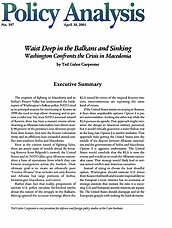The eruption of fighting in Macedonia and in Serbia’s Presevo Valley has underscored the bankruptcy of Washington’s Balkan policy. NATO cited as its principal reasons for intervening in Kosovo in 1999 the need to stop ethnic cleansing and to prevent a wider war. Yet, since NATO assumed control of Kosovo, there has been a massive reverse ethnic cleansing as Albanian nationalists have driven nearly 90 percent of the province’s non-Albanian people from their homes. And now the Kosovo Liberation Army and its offshoots have expanded armed conflict into southern Serbia and Macedonia.
Even as the current round of fighting fades, there are ample signs of trouble ahead. By wresting Kosovo from Belgrade’s control, the United States and its NATO allies gave Albanian nationalists a base of operations from which they can foment insurgencies across the borders. Their ultimate goal is to create an ethnically pure “Greater Albania” that includes not only Kosovo and Albania but large portions of Serbia, Montenegro, Macedonia, and Greece.
Rather than face that reality, proponents of current U.S. policy circulate far-fetched myths about the nature of the struggle in the Balkans. Having ignored the accurate warnings about the KLA issued by critics of the original Kosovo mission, interventionists are repeating the same kind of errors.
If the United States insists on staying in Kosovo, it faces three unpalatable options. Option 1 is passive accommodation–looking the other way while the KLA pursues its agenda. That approach might minimize the danger to American military personnel, but it would virtually guarantee a wider Balkan war in the long run. Option 2 is assertive mediation. That approach risks getting the United States into the middle of the dispute between Albanian nationalists and the governments of Serbia and Macedonia. Option 3 is aggressive confrontation. The United States would conclude that the KLA is now the enemy and would try to crush the Albanian nationalist cause. That strategy would likely lead to serious armed conflict and American casualties.
Instead of trying to choose the least dreadful option, Washington should extricate U.S. forces from Kosovo forthwith and transfer responsibility to the European Union. America has no economic or strategic interests that warrant the risks it is incurring. U.S. and European security interests are separable. The United States should disengage and let the Europeans grapple with making the hard decisions.

This work is licensed under a Creative Commons Attribution-NonCommercial-ShareAlike 4.0 International License.

